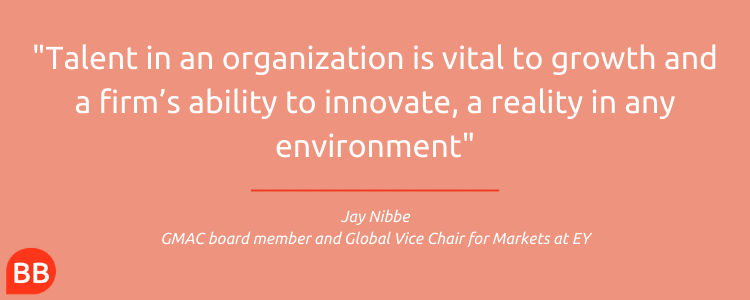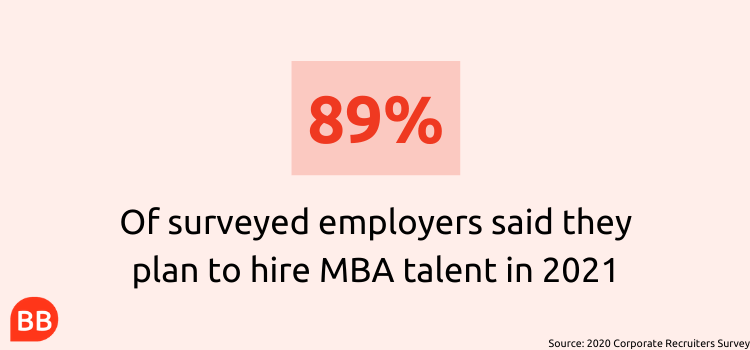Employers expressed optimism that MBA hiring will rebound in 2021 to pre-COVID-19 levels after a dip during the pandemic. That’s according to the 2020 Corporate Recruiters Survey published by the Graduate Management Admission Council (GMAC).
Before the pandemic, 92% of firms surveyed said they planned to hire MBA graduates in 2020. That figure then dropped to 77% among employers surveyed amid the global health crisis. But when GMAC asked employers about their hiring plans for 2021, nearly 90% responded by saying they plan to hire MBA graduates next year.
The optimism expressed by employers comes despite the uncertainty and economic retraction that has gripped the global economy since March 2020. The report was nearing conclusion in March, as the COVID-19 pandemic was unfolding.
GMAC initiated additional data collection that gives a clearer picture of the economic impacts the pandemic has had and will have across MBA hiring and salary trends.
The confidence employers have in the skills and abilities of graduate management talent indicates the roll business school graduates will play in the post-pandemic economic recovery.

MBA skills still attractive to employers
Before COVID-19, 90% of respondents indicated they were highly confident or confident about the ability of business schools to prepare students for success in their organization. That figure held steady at 87% in surveying performed this summer, highlighting the attractiveness of MBA degree holders and their ability to perform in times of transition and change.
Recruiters indicated strategic thinking, communication skills, and versatility as the skills they’re most confident in when it comes to a business school’s ability to prepare graduates for success in the workforce. These skills hold steady across the entire report.
One of the more noteworthy shifts when examining skills demand is the ability to navigate the challenges of technological disruption, which was identified by more than two-thirds of employers who responded as becoming more important as a result of COVID-19, followed by strong communication skills.
“Talent in an organization is vital to growth and a firm’s ability to innovate, a reality in any environment,” said Jay Nibbe, GMAC board member and Global Vice Chair for Markets at EY.
“The skills highlighted in this report represent significant competitive differentiation when it comes to a company’s ability to compete and create value in the marketplace, and they become even more important amid turmoil and constant change.”
WATCH
Rahul Choudaha, director of industry insights at GMAC, pointed out that the research in the report shows that as the pandemic resets the global economy and job market, corporate recruiter confidence in the skills and abilities of graduate management talent remains strong.
“This aligns with 2021’s robust MBA hiring projections as organizations plan for their recovery in a post-COVID world which demands meta-skills integral to managerial talents such as versatility and strategic thinking,” he said.
GMAC’s president and CEO, Sangeet Chowfla, added: “When thinking about the skills and experience required to help organizations and industries rebuild after an event like COVID-19, it makes sense that employers are expressing a desire to hire more MBA and business master’s graduates.
“The world was changing rapidly even before the current pandemic and while COVID-19 has brought with it perhaps unprecedented challenges across every sector, b-school classrooms have long been preparing MBA students for a dynamic and often uncertain environment. Employers place a premium on that kind of talent and perspective.”

MBA salaries remain strong despite economic uncertainty
Compensation for MBA graduates is a key pull of the degree, and the 2020 Corporate Recruiters Survey showed for the class of 2020 salaries will remain strong.
Most recruiters expressed intent to honor their organization’s compensation promises, with a minority of respondents saying they will reduce salaries, benefits, or bonuses.
The compensation premium commanded by business management graduates is also holding steady.
At $115,000, the median salary of MBA degree-holders is 75% more than those with a bachelor’s degree in pre-COVID sampling. That figure decreased slightly to $105,000 in post-COVID surveying.
The compensation premium is even more apparent for Fortune 100 companies and the big-three industries of hire for MBA graduates—consulting, finance, and technology. At $145,000, the median salary of MBA’s in the consulting industry is twice that of bachelor’s degree holders as indicated in data collected prior to March 17th.
With it looking less likely that MBA salaries will soften amid the COVID-19 environment and employers intending to hire MBA talent at the rate they did pre-pandemic in 2021, the value of graduate management talent will remain despite the economic uncertainty prevalent since March. In an uncertain world organizations need talent, and that’s a good sign for the business school class entering in 2020.



